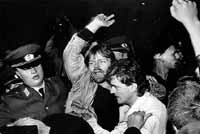Today East Germany turns 40. In East Berlin, the day begins with street cleaning: cleanup crews clear away the remains of last night's torchlight parade by the Free German Youth, at which a hundred thousand young people marched past Party leader and head of state Erich Honecker. At 10:00 a.m. a large military parade begins on Karl Marx Allee, despite objections from the Western allies. In the afternoon, all districts in the city hold street fairs.
But little enthusiasm is evident; the country is experiencing an
unprecedented degree of tension. Since September 10, thousands of people, many of them young, have been abandoning the country for the West, fleeing through Hungary or seeking refuge in West German consulates in Prague and Warsaw. The reasons are many: dissatisfaction with restrictions on travel, limited rights to free expression, lack of political freedom, the hypocrisy of the media, the shortage of consumer goods in comparison with the West, the deterioration of cities and factories. All this has caused disillusionment - and determination.
Around 5 p.m., several hundred young people gather on Alexanderplatz in East Berlin »to whistle at the elections«. They protest the manipulation of the most recent local elections with a concert of whistles, then debate with onlookers and begin to chant slogans. In contrast to earlier rallies, with their choruses of »We want out!«, this time the defiant cry is »We're staying here!« - meaning that the problems that have accumulated cannot simply be pushed aside, but must be dealt with in the country itself.
The protesters move in the direction of the Palace of the Republic, where top state and Party officials are celebrating the country's anniversary with invited guests, including Soviet reformer Mikhail Gorbachev; the crowd, now grown to two or three thousand, chants »Gorbi, help us« and »We are the people!« But they are pushed back by police, and turn north toward the district of Prenzlauer Berg. There, in the Gethsemane Church (Gethsemanekirche), a vigil for political prisoners has been going on since last week. When the demonstrators pass the offices of ADN, the state news agency, they yell »Liars! Liars!« and »Press freedom - freedom of opinion!« Police cars begin to arrive on the scene, and officers block off the side streets. There are scuffles and arrests, with police using their clubs. »No violence!« cries the crowd, surging forward. Fifteen hundred people finally reach the Gethsemane Church on Schönhauser Allee, as special units of the police and security officers hermetically seal the area. Toward midnight comes the order to attack; the same occurs in Leipzig, Dresden, Plauen, Jena, Magdeburg, Ilmenau, Arnstadt, Karl-Marx-Stadt and Potsdam, where other political demonstrations on this holiday are also broken up forcibly.
The same evening, a Social Democratic Party (SDP) for East Germany is founded in the small town of Schwante, north of Berlin. The party demands an ecologically-oriented social market economy with democratic control of economic power, free labor unions with the right to strike, the right to travel and emigrate, and recognition of two German states.
© 1999, Christoph Links Verlag, Berlin

